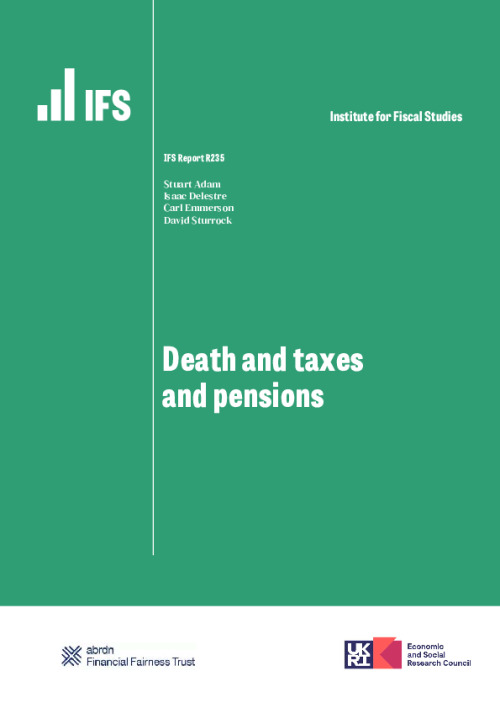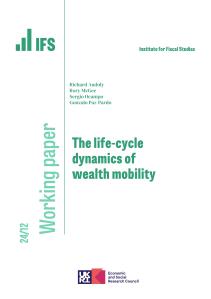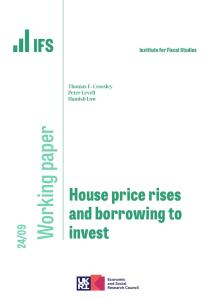Where an individual dies before age 75, funds remaining in their pension escape income tax entirely – there was income tax relief when the money was paid into the pension and no income tax when the money is taken out. Furthermore, any funds that remain in a pension at death (at any age) are not subject to inheritance tax. This results in the bizarre situation where pensions are treated more favourably by the tax system as a vehicle for bequests than they are as a retirement income vehicle. As such, there is a large incentive, for those who can, to use non-pension assets to fund their retirement while preserving their pensions for bequests.
This report sets out some options for a more coherent tax treatment of funds that remain in a pension at death. The reforms we propose, potentially with some transitional arrangements, would make the tax system fairer and more economically efficient. The revenue raised by moving to a more sensible system, even if relatively modest in the near term, could be substantial in the longer term. This revenue could be used to cut taxes elsewhere – including income tax and inheritance tax – or to ease the planned squeeze on public spending.
Key findings
1 Pensions are being increasingly used as a vehicle for bequests. Growth in defined contribution pensions along with the introduction of ‘pension freedoms’ would lead to more pension wealth being bequeathed at death even if people did not respond to the strong tax incentives to use pensions for bequests. Pensions and wealth-management professionals are fully aware of these tax benefits which, increasingly, are also being reported in the press. If nothing changes, more people will respond to the incentives the tax system creates.
2 Basic-rate income tax could straightforwardly be levied on all funds that remain in pensions at death. Alternatively, current income tax rules could extend to those inheriting pension pots from someone who dies before age 75. This would mean levying income tax when the person inheriting the pension pot withdraws the funds from it regardless of the age of death of the deceased. This could be combined with a minimum rate of income tax on withdrawals, set at the basic rate of income tax, in order to prevent funds withdrawn by non-income-tax-payers, in particular children, escaping income tax entirely.
3 Pension pots should be included in the value of estates at death for the purposes of inheritance tax. If we are to have an inheritance tax at all, it should apply evenly across all forms of wealth. Where the funds held in pension pots are to be subsequently subject to income tax – reducing their effective value – it would be appropriate for 80% of these funds to be counted for inheritance tax purpose.
4 Subjecting pensions to inheritance tax would raise revenue and remove the perverse incentive to avoid using a pension to fund retirement. Short-term revenue would be limited because few of those dying today are bequeathing pension pots. But if the generation benefiting from pension freedoms – those retiring after April 2015 – were to die with their full pension pots intact, we estimate that it would raise the equivalent of £1.9 billion a year (in today’s terms) in extra inheritance tax revenue. This increase would be substantial, representing an increase of around a quarter in the scope and yield of inheritance tax. The yield is very sensitive to the extent to which pensions will be run down before death: were half of current pensions intact at death, the yield would fall to £0.9 billion.
5 If the government did not want this change to increase the overall yield of inheritance tax, it could use the revenue to cut the inheritance tax rate and/or increase the threshold. To give a sense of scale, £1.9 billion would be roughly enough to reduce the rate from 40% to 30%, while £0.9 billion would be roughly enough to reduce the rate to 35%.
6 Reforms should be announced as swiftly as is practical. This would reduce the extent to which individuals will have saved in a pension in the incorrect expectation that they will be able to bequeath these funds under the current generous arrangements. As with any reform to wealth taxes, some retrospective taxation would be inevitable. If some transitional phasing of implementation were deemed appropriate, it would be straightforward for both the income tax and inheritance tax reforms we propose to be gradually introduced by date of death.














